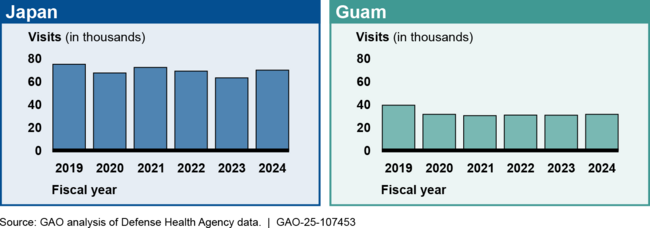Civilian Workforce: DOD Is Implementing Actions to Address Challenges with Accessing Health Care in Japan and Guam
Fast Facts
The Department of Defense relies on its civilian employees and contractors in Japan and Guam to provide services such as engineering, food service, and teaching. They may receive health care at military facilities but only on a space-available basis—after active-duty service members and their families.
Accessing health care through local providers can be difficult. For example, in Japan, they face language barriers and must pay for care up front. DOD started a program intended to help them find providers and pay bills. In Guam, DOD has a working group to address issues that may arise from planned growth of the civilian population on Guam.

Highlights
What GAO Found
Department of Defense (DOD)-affiliated civilians and families in Japan and Guam may receive health care at military medical facilities only if capacity allows (referred to as care on a space-available basis). As a result, these individuals generally rely on local providers for their health care. From fiscal years 2019 to 2024, the number of space-available visits for DOD-affiliated civilians and families at military medical facilities in Japan remained stable overall but varied by year. Over the same time frame, space-available visits at military medical facilities in Guam were stable after a 20 percent decline between 2019 and 2020. DOD officials attributed the decline to a shortage in enlisted support staff in primary care clinics and challenges related to the COVID-19 pandemic.
Space-Available Visits at Military Medical Facilities in Japan and Guam

In Japan, DOD-affiliated civilians and families face cultural challenges in accessing care with local providers. Commonly cited challenges include language barriers, complex billing, a different approach to care, and a different emergency care system. DOD has taken steps to address some of these challenges. For example, to make civilians more aware of potential challenges they may face, DOD developed a statement of understanding in April 2024 for prospective employees to sign prior to taking a position in Japan. This statement describes their responsibility for obtaining and paying for health care overseas and how health care services in Japan may not be equivalent to those in the United States. The statement is intended to encourage individuals to assess their personal health needs before accepting a job in Japan, according to DOD officials. The department also began a pilot program in January 2025, which is intended to help DOD civilians find Japanese providers and make required, up-front payments for care.
In Guam, DOD-affiliated civilians and families face capacity challenges in accessing care with local providers. Commonly cited challenges include failing infrastructure, limited health care professionals, and geographic remoteness. DOD has worked with Guamanian partners to attempt to lease land to build a new public hospital, has provided funding to upgrade existing public medical facilities, and plans to expand military medical facility capacity as the active-duty population grows on the island. DOD also has a working group to address issues that may continue to arise, given its planned growth of the civilian population on Guam.
Why GAO Did This Study
DOD relies on thousands of federal civilian employees and contractors in Japan and Guam to accomplish its missions in the increasingly important Indo-Pacific region. However, these individuals face unique challenges accessing health care. In 2022, the Defense Health Agency issued guidance restating that these individuals may receive care at military medical facilities only if capacity allows, because active-duty service members and their families are prioritized.
The National Defense Authorization Act for Fiscal Year 2024 includes a provision that GAO review health care available to U.S. civilians and contractors who support U.S. Forces Japan and Joint Region Marianas (Guam) overseas, their dependents, and certain dependents of active-duty service members. This report examines how often these DOD-affiliated civilians and families access health care at military medical facilities in Japan and Guam, the challenges these individuals face accessing health care through local providers in Japan and Guam, and the extent DOD is addressing any challenges.
GAO reviewed federal law, DOD documentation, and data on space-available visits from fiscal years 2019 to 2024; interviewed officials; and held five non-generalizable, in-person discussion groups with civilians randomly selected from lists of DOD civilians working in Japan and Guam.
For more information, contact Rashmi Agarwal at agarwalr@gao.gov.
